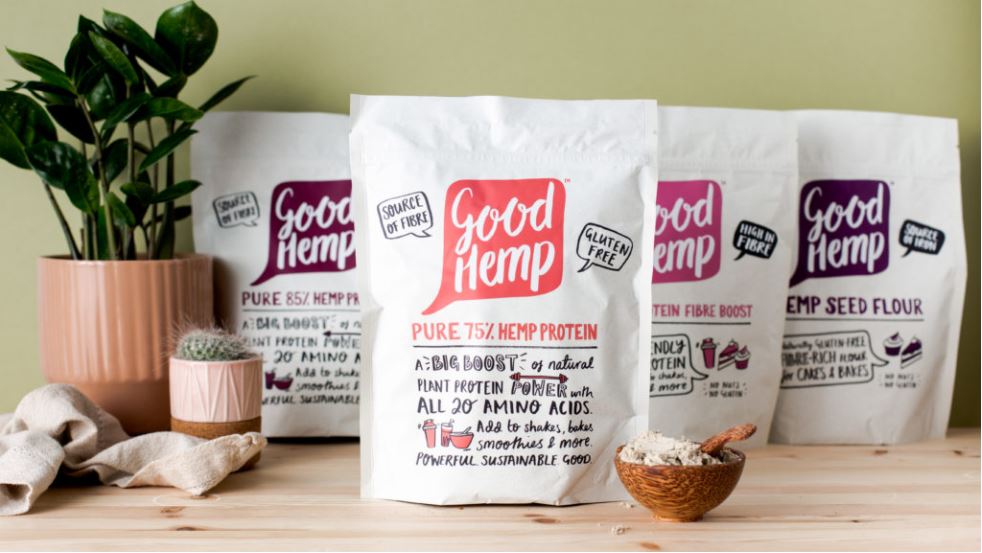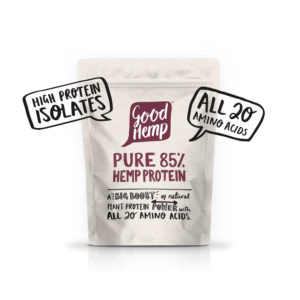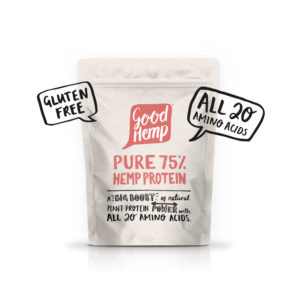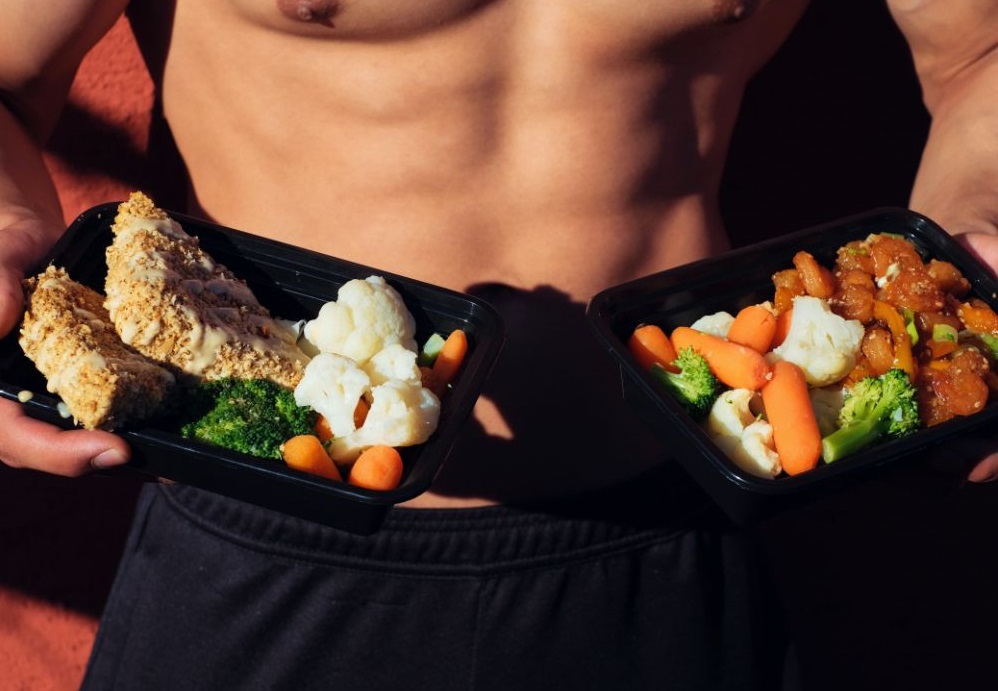Subtotal: £10.00
What Does Protein Do For Your Body?
There’s a common misconception that increasing protein intake is only necessary for gym dudes that want to bulk up. Despite the instantaneous success of Popeye’s bulging biceps after throwing back his can of spinach – spoiler alert – it doesn’t actually work that way.
Protein is a macronutrient and one of a complex group of molecules that benefits your body in all kinds of ways; from maintaining the health of your hair and nails, to building muscle mass and supporting the growth of your internal tissues and organs. In short, protein is an essential nutrient that your body needs to function to the best of its ability – and we at Good Hemp are totally here for it.
Why Is Protein Important For Your Body?
Ready for a science lesson? Proteins are made up of a combination of building blocks called amino acids, which provide us with enough energy to build and repair muscles and bones in the body – which is super important if you like to lift weights. There are 20 amino acids in the proteins you eat (including 9 that your body can’t manufacture itself), commonly found in animal products such as meat, dairy and fish, but also in natural plant-based products including pulses, beans and seeds.
So how much protein do you need? Before you channel your inner Arnie Schwarzenegger and start brushing your teeth with protein shakes, the amount of protein an individual requires depends on a whole bunch of things – your gender, diet, fitness routine and beyond.
The Statistics
According to research from the British Nutrition Foundation, the Reference Nutrient Intake (RNI) – or the level of intake of protein and nutrients considered adequate for good health – is 0.75g of protein per kilogram of body weight per day. The UK’s average daily protein intake is a sufficient 88g for men and 64g for women, but if you’re on a plant-based diet or work out more than once a day, you may need some help hitting your targets.
Health Benefits
Whether you’re fully on board or you roll your eyes at the gym-bunny table overflowing with acai bowls in your local cafe, there is actually a reason those post-workout brunch shots you see dominating your Instagram feed are so popular – besides looking artsy, of course.
We may have already mentioned, but there’s a long list of benefits that protein has on your body – especially if you’re seeking visible results. Not only does it help to promote muscle growth, it also aids metabolism, and improves recovery post-sweat, too, all of which allow you to reach peak performance when you’re hitting those HIIT classes.
So whether you fuel up on one of our tasty protein powder recipes or you prefer a slice of toast lathered in PB, consuming an adequate amount of protein after your workout will give your body the amino acids it needs to repair and rebuild those aching muscles – so you can do it all over again!
What Does A Lack Of Protein Do To Your Body?
Aside from not achieving your desired gains, there are more sinister outcomes that can result from a lack of protein. While Kwashiorkor (also known as Edematous Malnutrition) and Hypoproteinemia are two very rare, yet serious conditions that could be caused by low levels of protein (with some pretty nasty symptoms) – generally if you have a low intake you can expect to experience the following:
What Are The Signs Of Protein Deficiency?
- Skin, hair & nail loss or thinning
- Swelling
- Skin degeneration
- Fatigue and weakness
- Regular viral or bacterial infections
- Increased calorie intake
- Loss of muscle mass
How to Increase Protein Intake with Veggies
Being plant-based can come with its own challenges, one of which being whether or not you can get enough protein in your diet without chowing down on a hunk of steak. In short, the answer is yes. Luckily, increasing your protein intake is super easy (and delicious) thanks to Good Hemp’s hemp protein powders and recipes – which, naturally, are all veggie and vegan.

Despite popular belief, there’s a HUGE amount of protein available in a plant-based diet, from rainbow-coloured veggies to legumes, beans, grains, nuts, seeds and more. Whether you like to fill your bowl with hearty ingredients or you prefer to knock back one of our tasty hemp protein shakes, we’ve rounded up a list of the best vegan protein sources to inspire your next shopping list. Or, why not get a head start and add our range of vegan protein powders to your basket – perfect for stirring, baking or sprinkling!
Hitting your daily protein intake is a doddle when it comes to plant-based products such as hemp, quinoa, and chia seeds, since they contain all 9 essential amino acids that a human requires. Unsure where to start? Here are some of the best vegan protein sources:
- Hemp
- Quinoa
- Lentils
- Beans
- Chickpeas
- Nuts
- Pulses
- Chia seeds
- Grains
- Tofu
- Vegetables
What Happens If You Eat Too Much Protein?
Yes, we’ve been preaching about the importance of protein consumption for the majority of this article, but believe it or not, it’s possible to have too much protein in your diet (we’re looking at you, protein shake tooth-brushers). But before you start to question whether you’ve wasted the last 10 minutes of your time, it’s important to understand that you can have too much and too little of, well, everything – what we’re looking for is a healthy balance.
Those eager to see improvements in physical performance such as strength, muscle mass or speed are probably prioritising their protein intake over all other important nutrients, like carbs, fatty acids, fibre and vitamins – but these are just as essential for achieving optimal health. In 2017, the National Diet and Nutrition Survey showed that adults aged 19 to 65 consumed 45-55% too much protein on average! It’s like filling your car with petrol, but leaving your tyres flat – one won’t work without the other. Among other potential problems, eating too much protein can cause:
- Weight gain
- Dehydration
- Kidney damage
- Bad breath
- Calcium loss
- Constipation
According to Harvard Health Publishing, this generally relates to diets high in animal proteins containing lots of red meat and higher amounts of saturated fat, with less research to support risks associated with high-protein vegan diets – which is good news for us! Hemp seeds are an all-round winner when it comes to maintaining a varied diet, providing a great source of omega-3 fatty acids and fibre – and according the 90% of adults in the UK don’t get enough fibre, with the average daily intake averaging 15-21g per day whereas 30g is recommended! Omega-3 and fibre are essential for a healthy body and brain, and that’s why we want to help you get the most of them.
Now, we don’t like to blow our own trumpet at Good Hemp, but facts are facts, and luckily for you we’ve got a whole host of tasty hemp products that are bursting with goodness – well, what are you waiting for?

 Pure 85% Hemp Protein
Pure 85% Hemp Protein 
